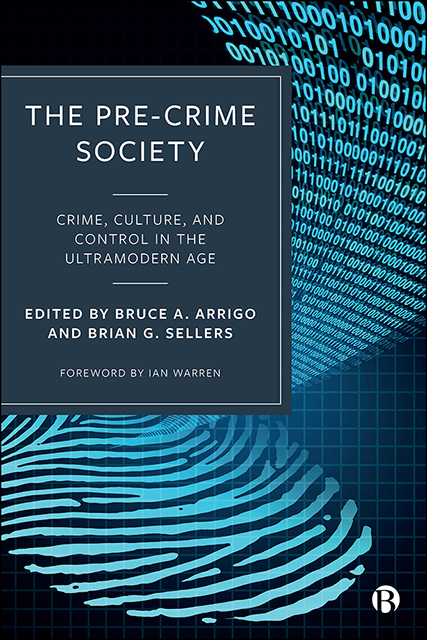Book contents
- Frontmatter
- Dedication
- Contents
- Notes on Contributors
- Foreword
- Introduction: The Ultramodern Age of Criminology, Control Societies and ‘Dividual’ Justice Policy
- Part I Theories, Theorists and Theoretical Perspectives
- Part II Institutions, Organizations and the Surveillance Industrial Complex
- Part III Dataveillance, Governance and Policing Control Societies
- Part IV Systems of Surveillance, Discipline and the New Penology
- Part V Globalizing Surveillance, Human Rights and (In)Security
- Afterword: ‘Pre-Crime’ Technologies and the Myth of Race Neutrality
- Index
11 - Dataveillance and the Dividuated Self: The Everyday Digital Surveillance of Young People
Published online by Cambridge University Press: 14 April 2023
- Frontmatter
- Dedication
- Contents
- Notes on Contributors
- Foreword
- Introduction: The Ultramodern Age of Criminology, Control Societies and ‘Dividual’ Justice Policy
- Part I Theories, Theorists and Theoretical Perspectives
- Part II Institutions, Organizations and the Surveillance Industrial Complex
- Part III Dataveillance, Governance and Policing Control Societies
- Part IV Systems of Surveillance, Discipline and the New Penology
- Part V Globalizing Surveillance, Human Rights and (In)Security
- Afterword: ‘Pre-Crime’ Technologies and the Myth of Race Neutrality
- Index
Summary
Introduction
‘Data is the new currency’ has become a deceptively simple mantra of the past decade; it is the oil of the digital era, the hitherto untapped gold mine of the 21st century. If we take the metaphor a little further and think of the phrase ‘to have currency’ (meaning something has a lot of value), is it then to suggest that those who produce more data should be considered to be more active and engaged citizens, and those who do not produce data—or produce less of it—are of less value? Furthermore, if data is as valuable a commodity as the metaphors suggest, it might follow that there would be significant regulation and safeguards about how, when and why it is harvested from the individuals that generate it.
In this chapter, we seek to explore the multiple ways in which young people experience everyday monitoring and dataveillance. The chapter is divided into three main sections. Firstly, we explore the concept of dataveillance, paying special attention to the way that it can be instructive and shape behavior. There is a pervasive presumption, similar to the excavation of oil, that data can be extracted from people and actions with little impact upon them. We seek to trouble this notion by exploring the way in which data and its uses are mutually transformative, shaping the future decisions and actions of data subjects. Framing the emergence of dataveillance with the Deleuzian concept of ‘dividuation’, we examine how the datafication industry has real consequences for young people. In a field in which empirical data is scarce, in the second section we draw upon findings from a study with young people themselves. In particular, there is a lack of research that gives young people the opportunity to define and identify the forms of surveillance they feel and experience. The findings are structured by a broad taxonomy of surveillance devices; visual, biometric, spatial and algorithmic in order to explicate the multiple ways in which the self becomes fragmented—dividuated—across dataharvesting technologies. The third and final section presents the key ethical concerns regarding the surveillance of young people. We argue that an approach that is oriented towards dividuals allows a rich and nuanced understanding of data ethics.
- Type
- Chapter
- Information
- The Pre-Crime SocietyCrime, Culture and Control in the Ultramodern Age, pp. 249 - 268Publisher: Bristol University PressPrint publication year: 2021



